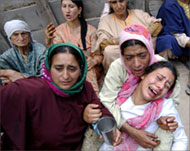Pakistan prime minister calls for unity
Pakistan must unite to reject and defeat terrorism which poses a threat to the country’s independence, the country’s prime minister says.

Speaking at a ceremony to mark Pakistan’s Independence Day, Shaukat Aziz also said a solution of Pakistan’s long-running dispute with India over the Kashmir region was vital for peace in south Asia.
“We have to send a message to the world that our society rejects extremism and is united against it,” Aziz said.
Rocket attack
But underlining the problems Pakistan faces 58 years after its independence from Britain, rebels were believed responsible for a string of small attacks in Baluchistan province, including a rocket attack on the home of Social Welfare Minister Zubaida Jalal.
No one was hurt in the attacks in the gas-rich province.
 |
|
Pakistan launched a crackdown |
The international security spotlight fell on Pakistan after four young British bombers, three of them of Pakistani origin, killed themselves and 52 others in blasts in London on 7 July.
At least two of the bombers had travelled to Pakistan several times and investigators are trying to determine what they did and who they met.
“Pakistan itself has suffered from terrorism. Terrorism is a big danger to Pakistan’s independence. We will fight this danger for the sake of independence of Pakistan and will defeat it at all levels,” Aziz said.
Crackdown
The authorities have rounded up about 600 people in the latest crackdown, launched after the London bombings.
|
“We will keep on harnessing our nuclear and missile capabilities in line with the changing situation” Shaukat Aziz, |
Pakistan’s military, which has ruled the country for more than half the country’s history, backed Islamic militants fighting Soviet forces occupying neighbouring Afghanistan in the 1980s as well as Muslim rebels in Indian-controlled Kashmir.
But military ruler General Pervez Musharraf, a staunch US ally, now promotes an ideology of “enlightened moderation” and has embarked on a tentative peace process with nuclear-armed rival India.
Among the problems Musharraf faces is a low-level insurgency in Baluchistan province where tribesmen say they have been robbed of the benefits of gas resources.
Kashmir is key
Speaking of the peace process with India, Aziz said the disputed Muslim-majority Himalayan region of Kashmir was key.
 |
|
Aziz said solving Kashmir was |
“Kashmir is a burning issue. Its solution is indispensable for durable peace – a solution that is in line with the wishes and aspirations of the people of Kashmir,” Aziz said.
India and Pakistan have fought three wars since 1947, two over Kashmir. They went to the brink of a fourth in 2002 but agreed to a ceasefire in Kashmir in late 2003.
Since then, they have restored diplomatic, travel and sports
links but have yet to achieve significant progress on Kashmir,
where rebels are battling Indian rule.
Balance of power
India has long accused Pakistan of training and arming militants, but Pakistan says it gives only political and diplomatic support to what it calls a Kashmiri freedom movement.
Aziz, citing Pakistan’s testing of its first nuclear-capable cruise missile on Thursday, also said Pakistan would maintain a balance of power in the region.
“We will keep on harnessing our nuclear and missile capabilities in line with the changing situation,” he said.
A former banker who became finance minister after Musharraf seized power in 1999, Aziz is credited with turning around an economy that was virtually bankrupt.